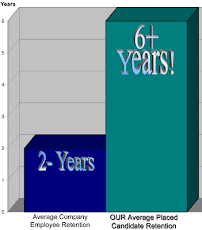A 54-year-old marketing executive, unemployed since October, hands out a simple business card as part of his job search. It lists his name, phone numbers, email account and suburban
Yet by divulging nothing about the executive's qualifications, his card hurts his chances to find work.
"This kind of card leaves you empty," contends Diane Darling, CEO of Effective Networking in
Whether you're starting over or starting out, you need a business card that makes a memorable first impression in today's tight employment market. How can jobless older applicants and young graduates devise cards that are successful marketing tools? There is no single formula for winning with cards, of course. But here are some strategies that might help:
Don't sell yourself short.
Put your profession, strongest skills or highest degree right under your name. For example, the
Her idea "makes a lot of sense," the unemployed manager agrees. He will consider adding "Strategic Marketing Executive" to his card.
Cards for recent alumni of well-known universities should contain their major, graduation year and school's name. If your alma mater approves, insert its logo.
Out-of-work applicants of any age also should buy and display a personal domain name on their cards. "You have a lifetime email address" even if you lack a Web site, Ms. Darling observes.
Exploit the reverse side.
"The back side of the business card is just undeveloped real estate because it's blank 90% of the time," insists Kevin Donlin, a professional résumé writer and job-search author in
Fill the top half of that space with key bullets about your professional achievements, the name of a prominent prior employer and addresses for your Web page, LinkedIn profile or "VisualCV."
VisualCV, a free service for individuals offered by a Reston,
"The way to make sure people read the back of your card is to ask," Mr. Donlin continues. "Say, 'There's a mini case study on the back about how I beat D&B's target by 59% in 2007 with half the budget and 71% fewer staff. Would that interest you?' "
Be creative -- within limits.
Printing cards on shiny paper looks distinctive, but defeats their purpose. Laurie Hayes, a small-business coach in
Your photo probably doesn't belong on your card. "I never saw a C-level [executive's] card with a picture," Ms. Madison says. A photo enables a hiring manager to remember your face -- and also discriminate against you, Ms. Darling notes.
A card with an impressive tagline stands out as long as you can substantiate your expertise.
Unemployed following the dot-com bust, Jeff Ackley landed a business-development job at an electronic-games company partly because his card bore a solid pitch. It said he sought a position where his five listed skills could propel a young business into profitability. A card with a personal pitch "is far more important today," says Mr. Ackley, now a
Use a simple typeface, high-quality paper and an elegant design. Match your résumé font.
A professionally prepared card shows you mean business. Ms. Madison met a woman at a Chamber of Commerce card-exchange session who offered a business card she had printed on 20-pound computer paper, cut out and signed by hand. "How can I take this person seriously?" the etiquette specialist wondered.
Create different cards for different opportunities.
This piece of advice especially makes sense if you possess many talents and are unsure what to do next, such as the
On the other hand, certain recent college graduates consider any cards unnecessary in their online world. "The very definition of 'business card' is kind of outdated now," a jobless 27-year-old woman reports.
Perhaps business cards are passé among 20-somethings, Ms. Darling says, "but 20-somethings won't give you a job."
by Joann S. Lublin, Wall Street Journal















